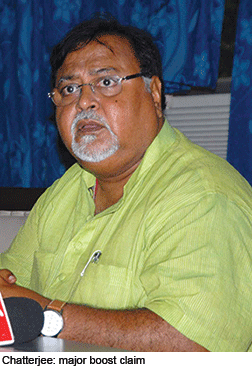The ruling trinamool congress (TMC) government in West Bengal is slipping deeper into the quicksand of the Saradha ponzi scam in which the savings of 1.7 million low-income households aggregating an estimated Rs.20,000 crore were misappropriated by the Saradha Group — a consortium of over 200 private companies — managed by Sudipto Sen reportedly close to the TMC. Simultaneously, students, professors and alumni of Jadavpur University (JU), civil society members and a host of political leaders, continue to protest against the state government’s covert influence on governor Kesari Nath Tripathy, who confirmed the appointment of Abhijit Chakraborty as the full-time vice chancellor of JU last month. This despite JU students agitating for Chakraborty’s resignation over a brutal police attack on peacefully protesting students on September 17 for pressing for an independent investigation into the molestation of a woman student inside a JU hostel on August 28.
 Therefore in a transparent bid to take the wind out of the students’ movement, the TMC government has announced a series of initiatives in the education sector. They include introduction of an online admission system for colleges, a new university Bill and liberal regulations for upgrading institutions of higher education.
Therefore in a transparent bid to take the wind out of the students’ movement, the TMC government has announced a series of initiatives in the education sector. They include introduction of an online admission system for colleges, a new university Bill and liberal regulations for upgrading institutions of higher education.
The long-awaited online process for admission into all government and government-aided colleges in the state will become operational next July. State education minister Partha Chatterjee, who had postponed the online admission system to next year on the pretext of inadequate technology/infrastructure in government colleges, confirmed on November 19 that all vice chancellors and principals have been instructed to implement the process from the start of the next academic year. To ensure this deadline is met, he decreed a grant of Rs.1.5 lakh to every college to purchase computer systems, accessories, electrical fittings, and software to prepare for online admissions.
Moreover in November, the state’s legislature passed two Bills to upgrade Raiganj College (estb. 1948) into a university to benefit students in the north and south Dinajpur districts. “This is the first aided college outside Kolkata to be upgraded to a university. It will provide a major boost to higher education in the rural hinterland,” says Chatterjee. The state’s legislative assembly has also passed a Bill giving the green light to the private sector Neotia University — promoted by Kolkata’s real estate tycoon Harsh Neotia. The university sited in the Diamond Harbour area of South 24 Parganas district will admit its first batch in 2015.
However the indications are that West Bengal’s — and particularly JU — students are unlikely to be assuaged by these sops. The reputation of the Mamata Banerjee-led TMC government, which ended 34 years rule of the CPM (Communist Party of India-Marxist)-led Left Front government in West Bengal (pop. 91 million) in May 2011 when it won a thumping majority in the state legislative assembly, has fallen so low that most students are skeptical about the beleaguered TMC government being able to meet its next July deadline for operationalising the online admissions process.
Moreover, the green light given to private universities has not aroused much enthusiasm within the state in which government college and university fees have been frozen for over four decades. Dr. Sukanta Bhattacharya, professor of economics at Calcutta University, doubts whether these “hackneyed damage control sops” will help the TMC government in re-establishing a rapport with the agitating students. “There’s pervasive doubt about whether the TMC government is serious about introducing reforms in education. The government’s initiatives in higher education are widely regarded as mere cosmetic changes,” he says.
Clearly there’s a winter of discontent ahead for institutions and students — particularly JU students.
Baishali Mukherjee (Kolkata)